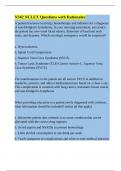N342 NCLEX Questions with Rationales
A patient has been receiving chemotherapy and radiation for a diagnosis
of non-Hodgkin's lymphoma. In your morning assessment, you notice
the patient has new onset facial edema, distention of head and neck
veins, and dyspnea. Which oncologic emergency would be suspected?
a. Hypercalcemia
b. Spinal Cord Compression
c. Superior Vena Cava Syndrome (SVCS)
d. Tumor Lysis Syndrome (TLS) Correct Answer-C. Superior Vena
Cava Syndrome (SVCS)
The manifestations in the patient are all seen in SVCS in addition to
headache, seizures, and often a mediastinal mass found on a chest x-ray.
This complication is common with lung cancer, metastatic breast cancer,
and non-Hodgkin's lymphoma
When providing education to a patient newly diagnosed with cirrhosis,
what information should be included? (select all that apply)
a. Inform the patient that cirrhosis is an acute condition that can be
alleviated with the correct drug regimen
b. Avoid aspirin and NSAIDs to prevent hemorrhage
c. Limit alcohol consumption to one drink per week
d. Teach symptoms of complications and when to seek medical attention
,e. Avoid hepatotoxic over-the-counter (OTC) drugs Correct Answer-B,
D, E
B. In patients with cirrhosis, especially if they have esophageal or gastric
varices as a comorbidity, use of aspirin and NSAIDs is discouraged. The
damage cirrhosis causes to the liver lowers its ability to assist in clotting
and taking aspirin and NSAIDs, which also have anticoagulant
properties, can increase the risk of hemorrhage
D. Patient should be informed of signs and symptoms to look for that
may indicate worsening of their condition. These can include peripheral
edema (swelling in extremities), signs of bleeding, ascites (build-up of
fluid in peritoneal cavity), alterations in mental status, asterixis (flapping
tremors), etc. If any of these symptoms occur, the patient should seek
medical attention right away
E. OTC drugs that may be toxic to the liver (ex: acetaminophen in high
doses) should be avoided because the damage that cirrhosis causes to the
liver makes it unable to metabolize those drugs
A nurse is teaching a patient about prevention of a second UTI. Which
of the statements made by the patient requires further intervention?
a. "I will stop taking my antibiotic once the symptoms are gone."
b. "I should consider drinking unsweetened cranberry juice in my diet."
c. "I will urinate regularly approximately every 3-4 hours"
,d. "I will remember to drink fluids adequately." Correct Answer-A. "I
will stop taking my antibiotic once the symptoms are gone."
It is important to take all antibiotics as prescribed. Symptoms may
improve 1-2 days after therapy, but organisms maybe still present.
A nursing student is teaching a patient about management of
constipation. The nursing instructor would intervene if the student made
which statement? (Select all that apply)
a. The use of laxatives and enemas will help free up blockage.
b. Eat foods with high fiber like raw vegetables and beans
c. Drink about 3 quarts of fluid including coffee and energy drinks.
d. Establish a regular time to defecate.
e. Exercise about 3 times a week. Correct Answer-A, C
A. Do not overuse laxatives and enemas because they cause dependence.
People who overuse them are unable to have a bowel movement without
them.
C. Fluid soften hard stools. Drink 2 L per day. Drink water or fruit
juices. Avoid caffeinated coffee, tea, and cola. Caffeine stimulate fluid
loss through urination.
, A nurse is reviewing lab values for a patient admitted to the hospital for
acute pancreatitis, what lab values would the nurse expect to see? (Select
all that apply.)
a. Elevated Serum Amylase
b. Decreased Phosphorus
c. Decreased Calcium
d. Elevated Serum Lipase Correct Answer-A, C, D
The primary diagnostic tests for acute pancreatitis are serum amylase
and lipase. The serum amylase level is usually elevated early and
remains elevated for 24 to 72 hours.
The nurse knows, which of the following patients is most at risk of
having another flair up of their chronic pancreatitis?
a. A 72-year-old female, who enjoys eating fried foods regularly and
states she prefers to eat late dinners just before bedtime.
b. A 23-year-old male, who was hospitalized with spleen injury after a
MVA, who states he drinks several times a week with his friends, and
takes NSAIDs to treat abdominal pain from his accident.
c. A 56-year-old male, who prefers drinking milk instead of water with
meals, and states his diet consists of mostly legumes and fish.
d. A 28-year-old female, with poly cystic ovarian syndrome and a BMI
of 31, who states she binges on sweets when she is feeling stressed from
work and school. Correct Answer-B. A 23-year-old male, who was
hospitalized with spleen injury after a MVA, who states he drinks




